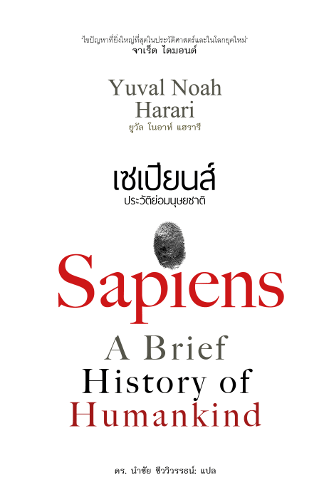

Just try to imagine how difficult it would have been to create states, or churches, or legal systems if we could speak only about things that really exists, such as rivers, trees and lions.“ Much of history revolves around this question: how does one convince millions of people to believe particular stories about gods, or nations, or limited liability companies? Yet when it succeeds, it gives Sapiens, immense power, because it enables millions of strangers to cooperate and work towards common goals. The difficulty lies not in telling the story, but in convincing everyone else to believe it.

There are no gods in the universe, no nations, no money, no human rights, no laws and no justice outside the common imagination of human beings.”

Yet none of these things exist outside the stories that people invent and tell one another. Judicial systems are rooted in common legal myths. States are rooted in common national myths. Churches are rooted in common religious myths. “ Any large-scale human cooperation – whether a modern state, a medieval church, an ancient city or an archaic tribe – is rooted in common myths that exist only in people’s collective imagination. So how did Sapiens manage to create cities with thousands of people? The answer is fiction. Most groups are usually limited to 150 people – above that number it becomes impossible to lead and organize the group in traditional ways. Many historical calamities, from deadly wars to ecological catastrophes, have resulted from this over-hasty jump.”
#SAPIENS BY YUVAL NOAH HARARI SUMMARY FULL#
Having so recently been one of the underdogs of the savannah, we are full of fears and anxieties over our position, which makes us doubly cruel and dangerous. Sapiens by contrast is more like a banana-republic dictator.

Millions of years of dominion have filled them with self-confidence. “Most top predators of the planet are majestic creatures. Thus humans who lived a million years ago, despite their big brains and sharp stone tools, dwelt in constant fear of predators, rarely hunted big game, and subsisted mainly by gathering plants, scooping up insects, stalking small animals, and eating the carrion left behind by other more powerful carnivores.” But humans enjoyed all of these advantages for a full 2 million years during which they remained weak and marginal creatures. It seems self-evident that these have made humankind the most powerful animal on earth. “We assume that a large brain, the use of tools, superior learning abilities and complex social structures are huge advantages. The truth is that from abut 2 million years ago until around 10,000 years ago, the world was home, at one and the same time, to several human species.” This linear model gives the mistaken impression that at any particular moment only type of human inhabited the earth, and that all earlier species were merely older models of ourselves. “It’s a common fallacy to envision these species as arranged in a straight line of descent, with Ergaster begetting Erectus, Erectus begetting the Neanderthals, and the Neanderthals evolving into us. Book Summary & NotesĪll text between quotation marks is taken directly from the book. In the end, Sapiens is an entertaining and informative narrative, and – even if you don’t buy all of Harari’s arguments – it will still make you think about human progress and the story of our species.įor more details and reviews go to Amazon. Harari takes the reader through the cognitive, agricultural, scientific, and industrial revolutions and at the end asks an interesting question: are we any happier for having followed this evolutionary road? The answer is arguably no – we have become more powerful as a species, but this not always coincided with improvement of the well-being of individuals. Telling stories, creating myths, and in general believing in abstract things allowed humankind to farm, build order, invent money, bureaucracy, religion, et cetera. In a way the question the book answers is: how could one seemingly insignificant species conquer the entire world, and become so deadly and successful? The answer to that question relates to our cognitive abilities, but the invention of fiction also plays a big role. Sapiens is the incredibly popular narrative of human history by Yuval Noah Harari that tells the story of the genus Homo from its very origins up to modern times.


 0 kommentar(er)
0 kommentar(er)
